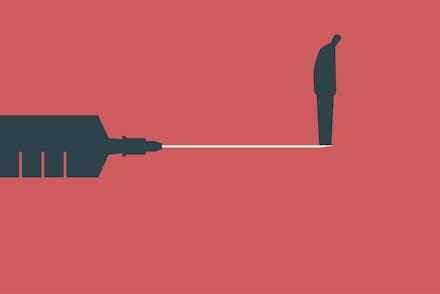Social distancing can be risky for people in recovery. Here's where to find help

These are trying times, especially for our most vulnerable communities, even in less conventional definitions of the word “vulnerable.” In-person recovery support meetings — which many rely on to stay sober — are canceled indefinitely around much of the country. People who are in clinical outpatient programs generally need daily visits to clinics, which is likely to become more difficult as social distancing becomes more mandated. People in recovery need their community’s support to stay strong and move toward living healthier lives. While lots of things are going to change for all of us during coronavirus, there are still many resources for folks struggling with addiction during the coronavirus pandemic.
“Most treatment centers remain open,” Tim Powell, a Dallas-based therapist and addiction specialist tells me. Some experts fear that the coronavirus could exacerbate the opioid overdose crisis, and are questioning whether treatment facilities are capable of handling addiction treatment during COVID, but SAMHSA (Substance Abuse and Mental Health Services Administration) is moving quickly to create evolving policies about how patients receive services and medicine.
According to SAMHSA’s most recent update, more patients will be allowed to use telemedicine for necessary doctor’s visits and some patients — such as those who may contract COVID — will be allowed to fill prescriptions for medications like methadone and buprenorphine, (medications that doctors use to treat the symptoms of withdrawal) at pharmacies instead of coming into a clinic where they could potentially spread the virus. The policies of clinics are changing too quickly to predict how long some services will be available and what kind of gap measures will emerge, but SAMHSA’s quick response to the changing needs of doctors and patients gives me hope.
For folks who are actively using drugs, HRC, the Harm Reduction Coalition is providing updated strategies to account for coronavirus. It is more important than ever that people have access to clean needles, don’t share their equipment, know what to do if they feel sick, and prepare for both drug shortages and the possibility for overdose in a moment when emergency services may be too taxed to respond quickly. Fentanyl test strips can be ordered online, and Narcan is available at many pharmacies.
For individuals in recovery who don’t require clinical intervention but do need free and consistent support, Powell recommends online meetings and services. SMART Recovery, an evidence-based (versus spirituality-based) “self-management and recovery training” program hosts many online meetings, as does Recovery Dharma, a mindfulness-oriented recovery support organization and AA. For a one-stop shop of online recovery support, check out In The Rooms, a database that has a comprehensive calendar of online recovery support meetings and events, and there are tons of sobriety support apps, like Loosid, a social networking app for sober folks.
If you are willing and able to pay for services, most recovery coaches will work with you remotely, and there are several online sobriety schools. If you’re stuck at home, now is a good time to catch up on some great recovery blogs, like LGBTteetotaler, a queer sobriety support network.
As the nation faces this pandemic, most of us are finding that we really need support and camaraderie right now. Solidarity demands our willingness to be in community with everyone, especially those who are at higher risk or infection in any way. For that reason, it’s more important than ever to stop stigmatizing people who use drugs or have Substance Abuse Disorder — they're already facing a myriad of new health and emotional challenges as a result of coronavirus. If you need to talk to a professional about resources for yourself or a loved one, call SAMHSA's hotline at 1-800-662-HELP. There’s someone there 24/7/365. If you have an overdose, call 911.